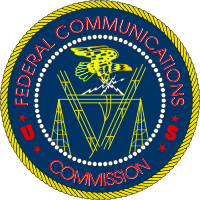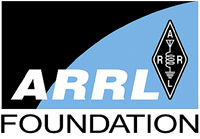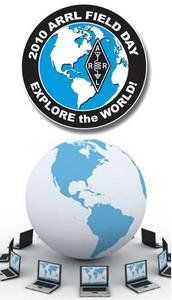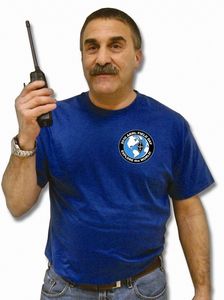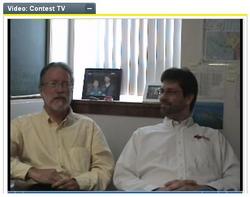 May 13, 2010 John E. Ross, KD8IDJ, Editor
| ||||||||
FCC News: FCC Proposes Additions, Changes to Amateur 5 MHz Allocation Acting on a 2006 Petition for Rulemaking filed by the ARRL, the FCC has issued a Notice of Proposed Rule Making (NPRM), ET Docket No 10-98 to modify the rules that govern amateurs' secondary use of five
channels in the 5 MHz frequency range known as 60 meters. The proposed changes would substitute a new channel for one that is seldom available because of occupancy by the fixed service, which is primary in this range. Also proposed is an increase in power from 50 to 100 W effective radiated power (ERP) and the addition of CW, PSK31 and PACTOR-III modes with provisions to ensure that such operations would be compatible with the primary service. Read more here. Hamvention: FCC Forum at Dayton Hamvention to Feature FCC Emergency Communications Expert The annual FCC forum at the 2010 Dayton Hamvention is scheduled for Saturday, May 15 9:15-10:15 AM in Forum Room 3 at the Hara Arena. Moderating again for 2010 will be Bill Cross, W3TN, of the FCC's Mobility Division. Cross's portfolio of responsibilities includes the Amateur Radio Service rules. Also speaking at this year's forum will be Curt Bartholomew, N3GQ, of the FCC's Public Safety and Homeland Security Bureau. Missing from this year's program will be Laura Smith, FCC Special Counsel who is responsible for Amateur Radio enforcement issues. She is unable to attend due to a previously scheduled family commitment. Public Service: National Hurricane Center's WX4NHC Sets On-The-Air Station Test The annual WX4NHC On-the-Air Station Test from the National Hurricane Center (NHC) in Miami will take place Saturday, May 29, 1300-2100 UTC. "The purpose of this annual station test is to test all of our radio equipment, computers and antennas using as many modes and frequencies as possible," said WX4NHC Assistant Amateur Radio Volunteer Coordinator Julio Ripoll, WD4R. "This is not a contest or simulated hurricane exercise." WX4NHC also will be testing new computers and software, as well as conducting operator training, and NHC Director Bill Read, KB5FYA, will be at WX4NHC making contacts. Read more here. ARRL Foundation: ARRL Foundation Awards 66 Scholarships in 2010 The ARRL Foundation Board of Directors is pleased to announce the scholarship recipients for 2010. Each year, the Foundation's Directors have the honor and privilege of selecting Amateur Radio operators who will receive monetary assistance to further their undergraduate or
graduate education. For 2010, the Foundation awarded 65 annual scholarships to young Amateur Radio operators valued at $71,450, almost $17,000 more than awarded in 2009. Four new scholarships were added for 2010: The Ted, W4VHF, and Itice, W4LVV Goldthorpe Scholarship; The Magnolia DX Association Scholarship and The Gwinnett Amateur Radio Society Scholarship. A second scholarship for the Bill, W2ONV and Ann Salerno Memorial Scholarship was also added this year. The application period for ARRL Foundation Scholarships opens October 1 each year and closes on February 1 the following year, with awards announced in May. Descriptions of all the available scholarships and selection criteria, as well as application instructions and forms can be found on the ARRL Foundation pages of the ARRL Web site. Beginning fall 2010, the application process for ARRL Foundation scholarships will "go green," with application forms and transcripts accepted via electronic means only. Click here for a list of the scholarship recipients. ARRL Field Day: ARRL Atlantic Division to Host Field Day Webinar Periodically, the ARRL's Atlantic Division hosts a "webinar" -- an interactive Web-based seminar, designed to facilitate communication between a small number of presenters and a large remote audience using the Internet. On Wednesday, May 19 at 9 PM EDT, Atlantic Division
Director Bill Edgar, N3LLR -- along with some "Field Day Experts" -- will present a Field Day-oriented webinar entitled "Making the Most of Field Day." Moderated by ARRL Regulatory Information Branch Manager and Field Day Manager Dan Henderson, N1ND, the webinar will share information, hints and tips to individuals and groups to maximize their Field Day experience -- not just in terms of points, but in gaining valuable experience and knowledge to help groups and individuals to help maximize their Field Day fun! Read more here. ARRL Field Day Merchandise Now Available How can you be the best-dressed ham at your Field Day site this year? When you wear the official 2010 ARRL Field Day shirt -- accompanied by the 2010 ARRL Field Day hat -- of course! Field Day -- Amateur Radio's largest on-the-air operating event -- is just a little more than six weeks away, so be sure to get your shirts, hats and pins, as well as the new ARRL Field Day Handbook for Radio Amateurs and coffee mugs before they run out. Field Day shirts are offered in sizes Small-4XL and are royal blue with the 2010 Field Day logo on the left chest; the back of
the shirt says "Amateur Radio -- Goodwill ⢠Service ⢠Fun!" with www.arrl.org underneath. Fulfill all your Field Day apparel needs at the Field Day Supplies section of the ARRL Web site. International: Canadian Hams Make Use of New Privileges After several years of hard work by the Radio Amateurs of Canada (RAC) and Industry Canada (IC) -- Canada's equivalent to the FCC -- Canadian amateurs received privileges on 2200 meters (135.7-137.8 kHz) at the first of the year. Scott Tilley, VE7TIL, of Roberts Creek, British Columbia, and John Gibbs, VE7BDQ, of Delta, British Columbia, completed the first official Canadian two-way 2200 meter QSO on April 24. Using CW, the Canadian amateurs reported strong signals during daylight QSO on 137.100 kHz. Roberts Creek and Delta are about 41 miles (66 km) apart. Gibbs used a homebrew tube transverter at 100 W output into a short top-loaded backyard wire vertical, while Tilley was running 400 W from a homebrew FET transmitter into a 60 foot top-loaded wire antenna. "As well as heralding the arrival of a new 'top band,' the QSO demonstrates that even amateurs located in typically small city-sized lots can enjoy the challenges that 2200 meters has to offer," Tilley told the ARRL. "Hopefully many other Canadian amateurs will soon be melting solder to join the fun on our new band!" More information on Canadian 2200 meter activity may be found on Tilley's Web site and at the VE7SL Radio Notebook Web site. Good News from Radio Kuwait: 7150 kHz and 7190 kHz both free! The IARU Region 1 Monitoring System is ever vigilant in monitoring the amateur bands for intruders. It is ably led by Coordindators Wolf Hadel, DK2OM, and Uli Bihlmayer, DJ9KR. To aid in their work they initiated an online reporting system via intruderalert@iaru-r1.org last year. On April 12, Uli first observed a shortwave station on 7150 and 7190 and alerted the monitoring group to listen and send reports to their appropriate authorities. Through combined efforts, Uli identified the station as Radio Kuwait. Once the station was identified, Uli immediately informed the German Federal Net Agency (Bundesnetzagentur) to monitor the QRGs and to send an official complaint to KWT. Also he sent a FAX and an e-mail to the Embassy of KWT in Berlin and e-mails to Radio Kuwait (radiokuwait@radiokuwait.org) and to the Ministry of Telecoms in Kuwait. Read more here. Solar Update Tad "The Sun does not shine upon this fair earth to meet frowning eyes" Cook, K7RA, reports: Sunspots disappeared again. After a strong
showing and nine days of sunspots, there have been four days with no sunspots. No indication when they will return, although the STEREO image shows an active area coming next week. With no sunspots again, perhaps our focus should return to low frequencies. Tom V. Segalstad, LA4LN, reports from Norway that a new temporary beacon on 509 kHz will be transmitting from grid-square JP20LL using a 35 meter (115 feet) tall vertical and 5 W until the middle of June. Look for more information on the ARRL Web site on Friday, May 14. For more information concerning radio propagation, visit the ARRL Technical Information Service Propagation page. This week's "Tad Cookism" brought to you by Charles Dickens' The Life and Adventures of Nicholas Nickleby (Chapter 6). This Week on the Radio This week, the Portuguese Navy Day Contest is May 15. The His Majesty King of Spain Contest (CW) and the Manchester Mineira All America
CW Contest are May 15-16. The Run for the Bacon QRP Contest is May 17. Next week, the Baltic Contest is May 22-23. All dates, unless otherwise stated, are UTC. See the ARRL Contest Branch page, the ARRL Contest Update and the WA7BNM Contest Calendar for more info. Looking for a Special Event station? Be sure to check out the ARRL Special Event Station Web page. ARRL Continuing Education Course Registration Registration remains open through Sunday, May 23, 2010, for these online course sessions beginning on Friday, June 4, 2010: Amateur Radio Emergency Communications Level 1; Antenna Design and Construction; Propagation; Analog Electronics, and Digital Electronics. To learn more, visit the CEP Course Listing page or contact the Continuing Education Program Coordinator. | ||||||||
